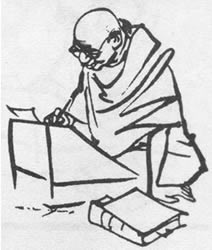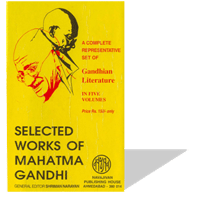
P.O. SEVAGRAM, DIST.WARDHA 442102, MS, INDIA. Phone: 91-7152-284753
FOUNDED BY MAHATMA GANDHI IN 1936
SECTION I : Selected Letters
[ from Selected Works of Mahatma Gandhi : Vol - 4 ]

SELECTED LETTERS
from
Selected Works of Mahatma Gandhi
Volume IV
Table of Contents
- Foreword
- Publisher's Note
SECTION I : LETTERS
- 1. To Dadabhai Naoroji
- 2. To G. K. Gokhale
- 3. To G. K. Gokhale
- 4. To Tolstoy
- 4A. From Count Leo Tolstoy
- 5. To Count Leo Tolstoy
- 6. To Leo Tolstoy
- 6A. From Count Leo Tolstoy
- 7. To Leo Tolstoy
- 7A. From Count Leo Tolstoy
- 8. To Maganlal Gandhi
- 9. To Maganlal Gandhi
- 10. To Narhar Shabhurao Bhave
- 11. To Mr Maffey, Private secretary To Viceroy
- 12. To W. B. Heycock
- 13. To Shankarlal on Ideas About Satyagraha
- 14. To Vinoba Bhave
- 15. To C F Andrews
- 16. To C F Andrews
- 17. To C F Andrews
- 18. To Kasturba Gandhi
- 19. To Kishorelal Mashruwala
- 20. To Sarojini Naidu
- 21. To Srinivas Sastri
- 22. To Srinivas Sastri
- 23. To Rabindranath Tagore
- 23A. From Rabindranath Tagore
- 24. To Rabindranath Tagore
- 25. From Rabindranath Tagore
- 25A. To Rabindranath Tagore
- 26. From Rabindranath Tagore
- 26A. To Rabindranath Tagore
- 27. To Rabindranath Tagore
- 28. To Rabindranath Tagore
- 29. To Rabindranath Tagore
- 30. To Rabindranath Tagore
- 31. To Rabindranath Tagore
- 32. From Rabindranath Tagore
- 32A. To Rabindranath Tagore
- 33. From G S Arundale
- 33A. To G S Arundale
- 34. To Every Englishman In India
- 35. To Viceroy
- 36. To Jawaharlal Nehru
- 37. To Jawaharlal Nehru
- 38. To Jawaharlal Nehru
- 39. To Jawaharlal Nehru
- 40. From Jawaharlal Nehru
- 41. To Jawaharlal Nehru
- 42. To Konda Venkatappayya
- 43. To T Prakasam
- 44. To Hakim Ajmal Khan
- 45. To Jamnalal Bajaj
- 46. To Mohomed Ali
- 47. To Motilal Nehru
- 48. To Motilal Nehru
- 49. To C Rajagopalachari
- 50. To C Rajagopalachari
- 51. To Kakasaheb Kalelkar
- 52. To A Friend
- 53. From Madeleine Slade or Miraben
- 53A. To Madeleine Slade
- 54. To Romain Rolland
- 55. To Romain Rolland
- 56. To Shri Shankaran
- 57. To Hermann Kallenbach
- 58. To Gulzarilal Nanda
- 59. To Dr Kailas Nath Kaju
- 60. To Dhan Gopal Mukherjee
- 61. To Henry S Salt
- 62. To The Viceroy
- 63. To Lord Irwin
- 64. To Reginald Reynolds
- 65. To Richard B Gregg
- 66. To Sir Samuel Hoare
- 67. To Ramsay MacDonald
- 68. To Pandit Malaviyaji
- 69. To The Secretary To The Government of Bombay, (Home Dept.), Poona
- 70. To Sir Tej Bahadur Sapru
- 71. To Carl Heath
- 72. To Carl Heath
- 73. To Carl Heath
- 74. To M A Jinnah
- 75. To M A Jinnah
- 76. To M A Jinnah
- 76A. From M A Jinnah
- 77. To M A Jinnah
- 78. From Subhash Chandra Bose
- 78A. To Subhash Chandra Bose
- 79. To Herr Hitler
- 80. To Every Briton
- 81. To Every Briton
- 82. To Generalissimo Chiang Kai-Shek
- 83. To Every Japanese
- 84. To American Friends
- 85. To Lord Linlithgow
- 86. To Lord Linlithgow
- 86A. From Lord Linlithgow
- 87. To Lord Linlithgow
- 87A. From Lord Linlithgow
- 88. To Lord Linlithgow
- 88A. From Lord Linlithgow
- 89. To Lord Linlithgow
- 90. To Agatha Harrison
- 91. To Winston Churchill
- 92. To Shriman Narayan
- 93. To Lord Pethick Lawrence
- 94. To Sardar Vallabhbhai Patel
- 95. To The Viceroy
- 96. To The Viceroy
- 96A. From Lord Mountbatten
- 97. To Abdul Ghaffar Khan
- 97A. From Abdul Ghaffar Khan
- 98. To A Friend
- 99. To Madame Edmond Privat
- 100. To The People of Gujarat
- Appendix I: Who Should Be Provincial Governors?
- Appendix II: A Psychological Explanation
- Appendix III: The Gandhian Constitutions for Free India
SECTION II : EXTRACTS FROM LETTERS
- Faith in God
- Religions and Scriptures
- Value of Prayer
- Truth and Non-violence
- The Science of Satyagraha
- Fasting in Satyagraha
- Unto This Last
- Khadi and Village Industry
- East and West
- Hindu-Muslim Unity
- Upliftment of Women
- The Good of All
- India's Freedom
- Education
- Caste System and Untouchability
- Brahmacharya
- Fearlessness
- Health and Hygene
- Self-restraint
- Self-development
- Selfless Service
- Voluntary Poverty
About This Volumes

Selected Works of Mahatma Gandhi comprises of Five volumes.
- Vol-I: Autobiography
- Vol-II: Satyagraha in South Africa
- Vol-III: Basic Works
- Ethical Religion
- Unto This Last
- Hind Swaraj or Indian Home Rule
- From Yeravada Mandir
- Discourses on the Gita
- Constructive Programme
- Key to Health
- Vol-IV: Selected Letters
- Vol-V: Voice of Truth
This book, Selected Letters, is volume-4.
Written by : M. K. Gandhi
General Editor : Shriman Narayan
Volume
Selected Works of Mahatma Gandhi : A set of five books
ISBN: 81-7229-278-3 (set)
Printed and Published by :
Jitendra T. Desai
Navajivan Mudranalaya,
Ahemadabad-380014
India
© Navajivan Trust, 1968
Download
Gandhi Letter 11 : To Mr Maffey, Private secretary To Viceroy1
Care District Magistrate,
Motihari,
April 16, 1917
DEAR MR MAFFEY,
I have come to this district to learn for myself whether there is truth in the
allegations of the ryots against the planters. I saw the Secretary of the Planters'
Association and then the Commissioner of the Division, and sought their cooperation.
Both politely rejected my advances and dissuaded me from my pursuit. I could not accept their advice, and have been proceeding with my work. The Magistrate has served upon me an order asking me to leave the
District. The grounds for the order are such as I cannot subscribe to. I have
therefore been reluctantly obliged to disobey the order and tell the Magistrate
that I shall suffer the penalty for the breach.
My motive is national service and that, too, so long as it is consistent with
humanitarian dictates. I understand, because my South African work was
considered to be humanitarian that I was awarded the Kaisar-i- Hind Gold
Medal. So long as my humanitarian motive is questioned, so long must I remain
undeserving of holding the medal. I am therefore asking my people to return
the medal to you, and I shall feel honoured to receive it back if it is returned to
me when my motive is no longer questioned.
As to the question itself, so far as I have been able to examine the evidence,
given to me, it shows that the planters have successfully used the Civil and
Criminal Courts and illegal force to enrich themselves at the expense of the
ryots, and that the ryots are living under a reign of terror and that their
property, their persons, and their minds are all under the planters' heels. One
man graphically said to me: "We belong to the planters, not to the Sircar.2
Thana3 is nowhere, the planters are everywhere. We take what they allow, and we keep what they permit." I had hoped that a deeper examination would have
toned down the impression formed by me. Had I been left free, I would have concluded my studies and placed the results at the disposal of the authorities. I wish that His Excellency would consider the matter serious enough to have an independent inquiry made.
The local administration admits that they are sitting upon a mine so dangerous
that they cannot tolerate my presence. And yet they manage to be satisfied
with the slow inquiry of a settlement officer. Everything will depend upon
swiftness and the proper choice of the members of the Committee of Inquiry.
This is the least that the ryots are entitled to. Will you please place this before
the Viceroy and ask for his forgiveness for sending such a long letter in the
midst of many imperative calls upon his time. The urgency of the matter is the
sole excuse for this letter.
I am, etc.,
M. K. GANDHI
Collected Works of Mahatma Gandhi, Vol. XIII, pp. 368-69
- Lord Chelmsford
- Government
- The Police Office